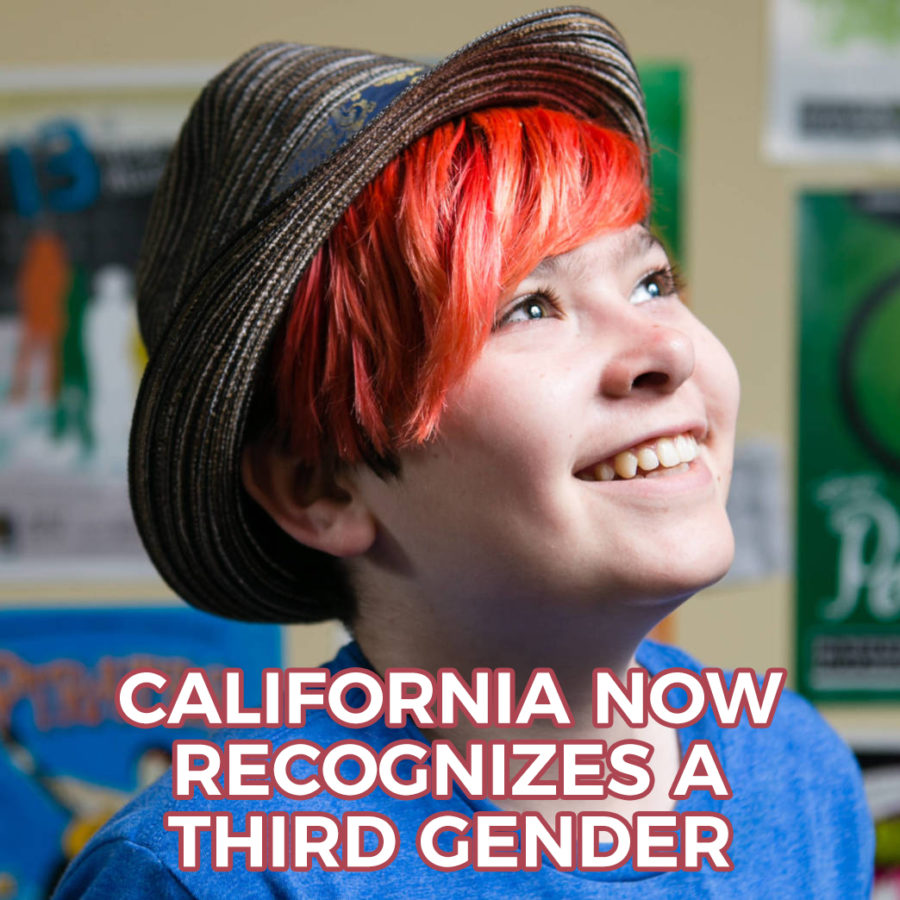By Jon Brooks
KQED
Gender is no longer either male or female, according to the state of California.
Gov. Jerry Brown on Sunday signed into law legislation that recognizes a third gender option for driver’s licenses and birth certificates. Starting in 2019, Californians will be able to identify themselves as not just male or female, but “nonbinary.”
The bill was one of many Brown left to the last day of the Oct. 15 deadline to either sign or veto.
California joins Oregon and Washington D.C. in creating the third gender option on driver’s licenses. New York state may follow suit. Unlike California, Oregon and Washington have not passed an actual law enacting the change. Countries that recognize a third gender include Australia, Germany and India.
The legislation, SB 179, from state Sen. Toni Atkins (D-San Diego) and Scott Wiener (D-San Francisco), also rescinds the requirement that individuals who want to change their gender must submit a sworn statement from a physician declaring they have undergone clinical treatment. That change takes effect Sept. 1, 2018.
“With Governor Brown’s signature on this bill, transgender and non-binary people will now be able to identify themselves as they are, not as who society tells them they should be,” said Wiener, in a statement.
The new law not only addresses the experience of inter-sex people — those individuals born with ambiguous sexual characteristics — but also codifies a growing trend among transgender youth who eschew a traditional gender identity, decoupling it from not only their innate physiology, but from the notion that only males and females exist.
A 2015 survey by the National Center for Transgender Equality found a third of the almost 28,000 respondents chose “nonbinary/genderqueer” when given a choice of terms to best describe themselves.
“The binary gender designations of female and male fail to adequately represent the diversity of human experience,” SB 179 states. “Nonbinary is an umbrella term for people with gender identities that fall somewhere outside of the traditional conceptions of strictly either female or male. ”
Courts in Oregon and California have already granted requests by residents to change their gender to a third type. In California, dozens of people have petitioned courts to make the change.
One person who will benefit from the law is Jak Kazmarek, a KQED employee who has identified as nonbinary for 17 years. Kazmarek uses the pronoun “they” instead of “he” or “she,” something many nonbinary people do to reflect a gender identification outside the traditional male or female.
Kazmarek says they were the 25th person in California to petition a court for a gender change to nonbinary, a request the court granted in May. But the change had no practical effect — there is currently no option to list your gender as anything other than male or female on a driver’s license.
“Right now, when somebody looks at an ID and they look at me, they don’t see female,” Kazmarek said. “They also don’t see male, though. That exposes me to a lot of questions. It’s a really vulnerable place to be.”
Kazmarek said that the state’s sanction of nonbinary identity is “huge.”
“It means that when somebody looks at my license, it’s not going to be as confusing to them.”
Ending the requirement that a physician sign off on someone’s change of gender will also have a big effect, Kazmarek said.
“I’ve been very privileged because I live in an area where people support me. There’s a lot of people that live in other areas where it’s difficult to find a doctor that’s willing to write that note.”
Opposition to the bill has come mostly from Christian groups. It did not appear to have much effect: The bill passed the Senate 26-12 and the Assembly 57-21.
The issue of whether or not to recognize a third gender is headed for a day of reckoning on the federal level, too. Last November, Colorado U.S. District Court Judge R. Brooke Jackson remanded the case of Dana Zzyym back to the U.S. State Department after Lambda Legal, on behalf of Zzyym, sued the department for denying Zzyym’s application for a passport. The agency rejected the request because Zzyym did not choose male or female on the application.
“I find that the administrative record contains no evidence that the Department followed a rational decision-making process in deciding to implement its binary-only gender passport policy,” Jackson wrote in his decision. “Therefore, the proper next step is to remand the case to the Department to give it an opportunity either to shore up the record, if it can, or reconsider its policy.”
But the State Department declined Zzyym’s application again, in May. The court then granted a motion to reopen the case.

